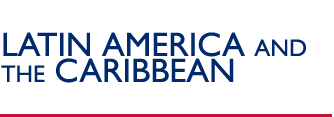
USAID supports more equitable access to education and technologies for disenfranchised students.
Bolivia Snapshot
Population: 9.427 million
GDP per capita: US $980
Population below poverty line: 67.3%
USAID IN BOLIVIA: http://bolivia.usaid.gov |
CONTACT INFORMATION
Mission Director:
Michael J. Yates
Obrajes, Calle 9 No. 104
La Paz, Bolivia
Tel: (591-2) 2786544
E-mail: wmur@usaid.go |
|
Overview
Bolivia continues to face significant development challenges including social exclusion, income inequality, lack of opportunities, and conflict.
 67.3% of the country’s population lives in poverty. Rural poverty is closer to 80%. 67.3% of the country’s population lives in poverty. Rural poverty is closer to 80%.- Of every 1,000 live births, 54 infants die. Life expectancy in Bolivia, at 64.4 years, is well below the region’s average.
- Continued migration to urban areas –currently 64% of Bolivians live in cities– has created enormous service delivery challenges.
- Despite improved school attendance, illiteracy remains high, especially among women (19.3%). On average, children in rural areas attend school for just over four years.
USAID’s program focuses on improving the effectiveness, responsiveness and transparency of democratic institutions; increasing economic opportunities for the poor; improving community health practices and services; enhancing the sustainable use of natural resources and biodiversity management; and promoting the social and economic development of rural farm families to reduce illicit coca production.
Programs
Economic Growth:
USAID helps create opportunities for small- and medium-sized Bolivian businesses and small farmers to increase their incomes. USAID expands financial services to underserved areas; improves agricultural technology and market access; and increases the productivity of small Bolivian businesses.
- Since 2001, the USG has helped more than 50,000 poor farm families to increase their incomes on average by 50%.
- From 2003 through 2006, the USG helped create over $43 million in value-added exports, generated some 3,000 permanent, full-time jobs (many of these women), and incorporated over 350 small enterprises into export chains.
Health:
USAID improves the provision of health services for Bolivia’s peri-urban and rural poor. Community-based programs are strengthened to improve the capacity of individuals, families and communities to improve health; expand delivery of quality, high-impact services; and improve the effectiveness of healthcare providers.
- With USAID support, PROSALUD and CIES, two private not-for-profit health networks, provide some 800,000 medical consultations annually, in eight of the country’s nine departments. These non-governmental organizations are two of Bolivia’s most important health care providers.
- USAID helped improve more than 12,000 houses in Chagas-affected areas of the country.
Integrated Alternative Development:
USAID helps diversify economic development in coca growing and associated areas by increasing the competitiveness of rural enterprises; strengthening local democratic institutions and processes; and improving basic public services and social conditions.
- From October 2006 to September 2007, sales of alternative development products increased by $16.5 million.
- Net family income of beneficiaries increased by more than $400 in the last four years.
- Since 2004, over 5,000 small farmers have received title to their land, with another 15,000 set to receive their land titles in 2008.
Environment:
USAID seeks to improve forestry management; conserve targeted parks and protected areas; and reduce urban and industrial pollution through improved environmental management.
- USAID helped Bolivia to become the world’s leader in forest certification, with more than 2.2 million hectares of forest voluntarily certified.
Democracy:
USAID supports Bolivian efforts to strengthen democratic institutions and processes consistent with the Organization of American States’ Inter American Democratic Charter. USAID collaborates with key democratic institutions, including the Executive Branch, the Judicial Branch, the Congress, regional and municipal governments, and civil society organizations.
- USAID-supported Integrated Justice Centers have provided free justice services to over 60,000 Bolivians since January 2005.
Food Security:
USAID uses food and local currency to support community efforts to enhance household food security. Efforts are focused on creating opportunities for impoverished families in the poorest regions; improving maternal-child health; extending water and sanitation services; and promoting better natural resource management.
- From 2002 to 2006, USAID reached nearly one million people in the poorest, most food-insecure areas of Bolivia with critical assistance.
|


